- Home
- Taylor Caldwell
The Late Clara Beame
The Late Clara Beame Read online
Table of Contents
The Late Clara Beame
Publishing Information
Author Page
Books by Taylor Caldwell
Chapter 1
Chapter 2
Chapter 3
Chapter 4
Chapter 5
Chapter 6
Chapter 7
Chapter 8
Chapter 9
Chapter 10
Preview
The Late Clara Beame
by
Taylor Caldwell
Publishing Information
The Late Clara Beame
by Taylor Caldwell
Copyright © 1963 by Reback and Reback
Copyright renewed
mobi digital edition Copyright 2012 by eNet Press Inc.
All rights reserved.
Published by eNet Press Inc.
16580 Maple Circle, Lake Oswego OR 97034
Digitized in the United States of America in 2012
Revised 201208
www.enetpress.com
Cover designed by Eric Savage; www.savagecreative.com
ISBN 978-1-61886-436-9
Author Page
Taylor Caldwell, christened Janet Miriam Holland Taylor Caldwell, was born in Manchester, England on September 7, 1900, into a family of Scottish background. Her family descended from the Scottish clan of MacGregor of which the Taylors are a subsidiary clan. In 1907 she emigrated to the United States with her parents and younger brother. Her father died shortly after the move, and the family struggled. At the age of eight she started to write stories, and in fact wrote her first novel, The Romance of Atlantis, at the age of twelve! (although it remained unpublished until 1975). She continued to write prolifically, however, despite ill health.
Taylor Caldwell was also known by the pen names of Marcus Holland and Max Reiner as well as her married name of J. Miriam Reback. Her works include Dear and Glorious Physician, a novel detailing the exploits of Saint Luke, The Listener, written about a mysterious altruistic individual who lends an ear where it is needed, and Dynasty of Death, a saga about a family of munitions makers.
In 1918-1919, she served in the United States Navy Reserve. In 1919 she married William F. Combs. In 1920, they had a daughter, Mary (known as ‘Peggy’). From 1923 to 1924 she was a court reporter in New York State Department of Labor in Buffalo, New York. In 1924, she went to work for the United States Department of Justice, as a member of the Board of Special Inquiry (an immigration tribunal) in Buffalo. In 1931 she graduated from the University of Buffalo, and also was divorced from William Combs.
Caldwell then married her second husband, Marcus Reback, a fellow Justice employee. She had a second child with Reback, a daughter Judith, in 1932. They were married for 40 years, until his death in 1971.
In 1934, she began to work on the novel Dynasty of Death, which she and Reback completed in collaboration. It was published in 1938 and became a best-seller. ‘Taylor Caldwell’ was presumed to be a man, and there was some public stir when the author was revealed to be a woman. Over the next 43 years, she published 42 more novels, many of them best-sellers. For instance, This Side of Innocence was the biggest fiction seller of 1946. Her works sold an estimated 30 million copies. She became wealthy, traveling to Europe and elsewhere, though she still lived near Buffalo.
Her books were big sellers right up to the end of her career. In 1979, she signed a two-novel deal for $3.9 million. During her career as a writer, she received several awards: The National League of American Pen Women gold medal (1948); The Buffalo Evening News Award (1949); The Grand Prix Chatvain (1950).
She was an outspoken conservative and for a time wrote for the John Birch Society’s monthly journal American Opinion. Her memoir, On Growing Up Tough, appeared in 1971, consisting of many edited-down articles from American Opinion.
Around 1970, she became interested in reincarnation. She had become friends with well-known occultist author Jess Stearn, who suggested that the vivid detail in her many historical novels was actually subconscious recollection of previous lives. Supposedly, she agreed to be hypnotized and undergo ‘past-life regression’ to disprove reincarnation. According to Stearn’s book, The Search of a Soul - Taylor Caldwell’s Psychic Lives (1973), Caldwell instead began to recall her own past lives - eleven in all, including one on the ‘lost continent’ of Lemuria.
In 1972, she married William Everett Stancell, a retired real estate developer, but divorced him in 1973. In 1978, she married William Robert Prestie, an eccentric Canadian 17 years her junior. This led to difficulties with her children. She had a long dispute with her daughter Judith over the estate of Judith’s father Marcus; in 1979, Judith committed suicide. Also in 1979, Caldwell suffered a stroke, which left her unable to speak, though she could still write. (She had been deaf since about 1965.) Her daughter Peggy accused Prestie of abusing and exploiting Caldwell, and there was a legal battle over her substantial assets.
She died of heart failure in Greenwich, Connecticut on August 30, 1985.
Books by Taylor Caldwell
1938 Dynasty of Death
1940 The Eagles Gather
1941 The Earth is the Lord’s: A Tale of the Rise of Genghis Khan
1941 Time No Longer
1942 The Strong City
1943 The Arm and the Darkness
1943 The Turnbulls
1944 The Final Hour
1945 The Wide House
1946 This Side of Innocence
1947 There Was a Time
1948 Melissa
1949 Let Love Come Last
1951 The Balance Wheel
1952 The Devil’s Advocate
1953 Maggie - Her Marriage
1954 Never Victorious, Never Defeated
1955 Your Sins and Mine
1956 Tender Victory
1957 The Sound of Thunder
1959 Dear and Glorious Physician
1960 The Listener
1961 A Prologue to Love
1963 Grandmother and the Priests
1963 The Late Clara Beame
1965 A Pillar of Iron
1965 Wicked Angel
1966 No One Hears But Him
1967 Dialogues With the Devil
1968 Testimony of Two Men
1970 Great Lion of God
1971 On Growing Up Tough
1972 Captains and the Kings
1973 To Look and Pass
1974 Glory and the Lightning
1975 Romance of Atlantis (with Jess Stearn)
1976 Ceremony of the Innocent
1977 I, Judas (with Jess Stearn)
1978 Bright Flows the River
1980 Answer as a Man
Chapter 1
Five days before Christmas Samuel Bulowe was found dead in his bed in Chicago.
An autopsy revealed that the cause of death was a virulent poison, the source of which was not known. The autopsy also revealed that he had been suffering from a smoldering malignancy. He had never confided in any friend about this, had never told his wife, nor his wife’s brother, Dr. David Gates.
A note had been found at his bedside. He had written: “I can’t see any way out of the situation but this. I’m terribly sorry. I know how you’ll feel. But I can’t think of any alternative. I know you will understand. — Affectionately — Sam.”
The verdict was suicide, the motivation despair over his condition. He was b
uried quietly in a small suburban cemetery near Chicago, a city in which he had lived for the past five years. Alice, his young wife, returned to New York to resume her work as a free-lance artist. Her brother, Dr. Gates, went back to Cleveland, to his practice as a heart specialist.
The Fraziers, Henry and Laura, had planned to spend the holidays with the Bulowes, for Henry had been a lifelong friend of Sam’s and Laura and Alice were related. After the funeral, however, they had returned sadly to their home in Connecticut, though they had wanted to stay with Alice for a longer time. But Alice had been adamant that they should leave. She had always felt animosity towards Laura which she had never bothered to hide.
Laura, on the other hand, was delighted when Alice returned to New York and established herself in the Village. Alice, however, did not return Laura’s affection, and rarely accepted an invitation to visit the Fraziers. Her last visit had been in August, and that had been only courtesy because Laura had broken her leg in a fall from a swing a few days before.
“Always trust dear little Laura to do something ridiculous,” Alice had told her brother. “Swinging like a child, and pregnant, too!”
On December 15, Laura wrote to Alice, inviting her to spend Christmas with them ‘in the country’. Alice had not as yet answered. She sat with the letter at her elbow, in her inexpensive but comfortable apartment. While her brother watched her, she glanced again at the letter, then flicked it aside contemptuously.
“Let me repeat,” David said, with an elaborate air of exasperated patience. He was very like his sister in that they both had somewhat irascible dispositions. “Hank’s dangerous, all around.”
“The police were satisfied, in Chicago,” Alice reminded him.
“They may have been convinced, all right,” David said.
“I helped. I thought there’d never be any more questioning. Now I’m not too sure — about anything. And now I think that Hank is becoming more and more dangerous. I want to know just how dangerous he is. It could be that he doesn’t know a thing, except what he read in the papers; I don’t believe it any longer. Besides, I found those doodlings and notes of Sam’s, and they’re definitely revealing. You’ve read them.”
Alice stared at her brother, her lovely, pale face expressionless, and then suddenly her eyes filled with fear. “Yes, I’ve read them. So did the police, didn’t they?”
“Maybe. I don’t know. They searched everything, and they probably looked in Sam’s private files. Police don’t let up on an unsolved murder. All right! They did finally believe it was suicide. You think I’m jumping at shadows. I’m not.”
“The police never traced the poison to you,” Alice pointed out. “Or your office.”
“No,” David said. “I had only one capsule of it.”
Alice clenched her hands in her lap. Her husband had once called her ‘the ice-blue lady’. David, watching her, pursed his lips and thought, ice-blue heart, too. Alice was capable of anything; he, David, ought to know. She affected blue almost exclusively, in all shades. She wore a blue wool dress tonight, and blue earrings. Her flawless skin glistened in the lamplight. “I refuse to let you frighten me,” she told him. “I don’t believe Hank Frazier knows anything at all. If he knew, I’d have guessed it before now.”
“Remember, he took you out a lot last summer, to shows and theatres, while Laura was nursing her broken leg in the wilds of Connecticut. He was feeling his way around, looking for something, trying to find out something. You admit that?”
“I’m not so sure, now,” Alice said. “You did put a lot of suspicions in my mind, and I watched him and listened to him, but there was nothing at all. If he had known something I’d have found it out. Men aren’t very subtle, and I had five years of dealing with Sam. None of you can keep secrets.” She paused. “When did you begin to suspect, anyway?”
“I suspected from the very beginning, though I only told you about it last spring. After I went through Sam’s papers. Then I began to have cold chills.”
Fear again brightened Alice’s eyes.
“And that’s why you’ve got to accept Laura’s invitation and go up to Connecticut and take me along.”
“You and Hank never liked each other,” Alice retorted, “though you were slum boys together, all three of you, which includes Sam.”
“You’d have been a slum girl, yourself, sweetie, if old Aunt Clara hadn’t rescued you,” her brother reminded her.
“She sent you through medical school. Have you forgotten?”
“To please you, dear. But she left you practically nothing, after all.”
“That was Laura’s little trick.” It was hard for Alice to look anything but composed, but she succeeded now. A dark shadow passed across her face. “Dear little Laura! Just like a snuggling kitten, looking for love, love, love! She got around Aunt Clara very nicely.”
“And got all three millions of Aunt Clara’s nice fat dollars, and the family home in Connecticut, not to mention the house on East 72nd Street, and real estate in Florida.”
David was goading her deliberately. Alice stared at her brother, not seeing him. He leaned against the old mantelpiece, feeling the heat from the gas logs along his side. He was a tall young man in his early thirties, black-eyed, black-haired, and slender, even elegant. There was little resemblance between him and his sister, except for the smooth tight hardness of his face and his graceful movements. David Gates was tough. He had had to be tough to survive, and he intended to survive in a world that was becoming daily more complex, and competitive. An excellent heart specialist, much admired by older colleagues, he knew that his contemporaries were struggling to be what he was, and to supplant him if possible.
“I could use some of Aunt Clara’s money,” he mused, watching his sister with a curiously intent look.
“There’s something else I never told you,” Alice confessed. “When Laura came into all that money on her twenty-first birthday she deposited one hundred thousand dollars to my account. That was just before I married Sam.”
“Oh?”
“I refused it,” Alice told him.
“But why?”
“I expected half of Aunt Clara’s estate,” Alice replied. “I thought Laura’s action was a nasty insult.”
David threw up his hands. “I’d like to be insulted that way! One hundred thousand dollars! And Sam Bulowe with only fifty thousand dollars in life insurance, and you only got five thousand of it because he was a — a suicide! Think what you could do now with that money! You’re a fool, Alice.”
She didn’t answer him. He moved closer. “How about killing two birds with one stone?”
“Sam left you two thousand dollars,” Alice reminded him. “There was six thousand dollars for me, besides the insurance money. Sam wasn’t very aggressive.” She spoke as if she had not heard her brother. Then she asked warily, “What do you mean, ‘killing two birds with one stone’?”
He pointed to the small table beside her. “Just do as I say. Call dear little Laura and say you’d love to spend the holidays with her and Hank, but I’ve suddenly come to town to ‘console’ you for being so alone, and you don’t want to leave me. So — she’ll invite me too. She’s got a soft heart.” He paused. “I want to find out what he knows. Do I have to repeat that again? He’s dangerous, I tell you, if he knows something.”
Alice stretched out her hand and took up the receiver, and her eyes, as she looked at her brother, were inscrutable. She gave the operator the number, and murmured under her breath, “Two birds with one stone.” Suddenly her face grew vivid with hatred.
“There’s no statute of limitations on murder,” David commented, but Alice was asking: “Laura?”
Chapter 2
The snow dappled the old leaded windows and the wind hummed in the great chimney. The fire on the hearth crackled merrily and the big room flickered with
rosy light. A soft lamp was lit here and there, revealing Sheraton tables, books in oak cases, and Queen Anne sofas. The French cabinets along the wall were filled with Dresden figures and curios gathered over a period of two hundred years.
Laura Frazier was seated before a grand piano, her fingers moving through an intricate Mozart phrase. The delicate tinkling sound filled the room.
Henry Frazier sat near the fire, relaxed and content, smoking his pipe, a book open on his knee. He had a strong, quietly masculine face and steady hazel eyes. Thirty-five years old, he was ten years older than his wife, and a successful partner in the New York law firm of Bancroft, Edell, Frazier and Hunt.
As he listened to his wife play, he found his thoughts drifting back to his harsh childhood in a New York tenement district; he remembered how he and David Gates and Sam Bulowe had worked after school and on Saturdays delivering groceries and doing odd jobs to augment the family income. They had had, more than anything else, ambition. He had always wanted to be a lawyer and Dave a doctor. But Sam had never had a definite goal, for though he possessed the others’ drive, he had no particular talent; he would just say that when he was a man he would be ‘rich’. At the time of his death, one year before, at thirty-six, he had been sales manager for a wholesale appliance house in Chicago, earning twelve thousand dollars a year, with prospects of a partnership.
“It was just as well,” Henry said to himself. “If he’d lived, with that disease in him, he’d have had several months of misery and pain. Yes, it was just as well, after all.”
His thoughts moved on to Clara Beame, who had been born in this house. Good old Aunt Clara (or was she really only old Cousin Clara, a couple of times removed?). Not even Laura was quite certain of the relationship between them and Alice and David. The old lady had been fond of Laura’s father, but when he had remarried his first wife after Laura’s mother’s death Aunt Clara had refused to see him again. Funny old fat spinster, Henry reflected. He had only seen her photograph, but Clara Beame had borne a remarkable resemblance to Queen Victoria, with the same determined mouth and shrewd eyes.

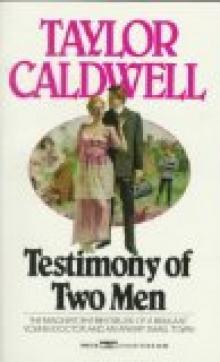 Testimony of Two Men
Testimony of Two Men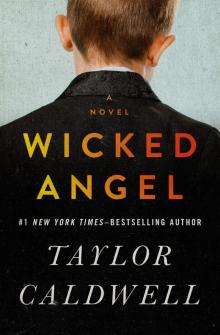 Wicked Angel
Wicked Angel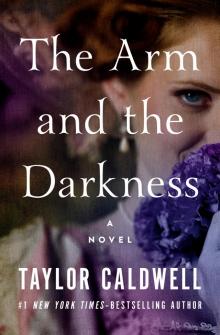 The Arm and the Darkness
The Arm and the Darkness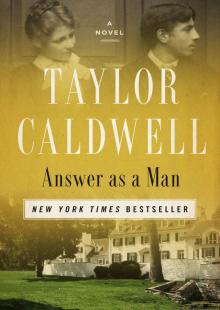 Answer as a Man
Answer as a Man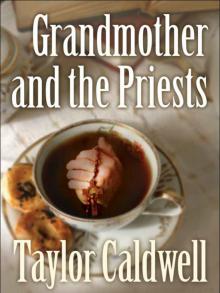 Grandmother and the Priests
Grandmother and the Priests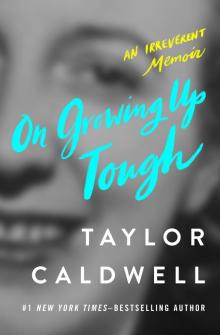 On Growing Up Tough: An Irreverent Memoir
On Growing Up Tough: An Irreverent Memoir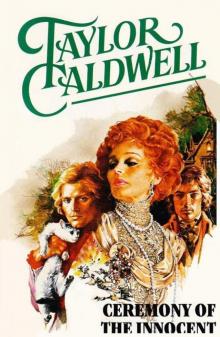 Ceremony of the Innocent
Ceremony of the Innocent The Listener
The Listener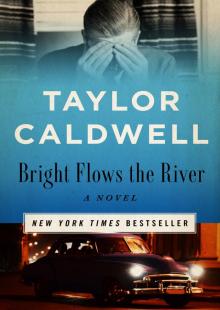 Bright Flows the River
Bright Flows the River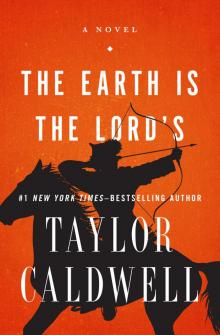 The Earth Is the Lord's
The Earth Is the Lord's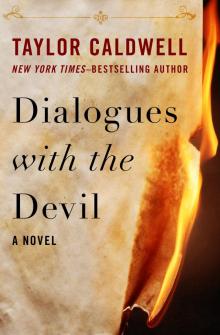 Dialogues With the Devil
Dialogues With the Devil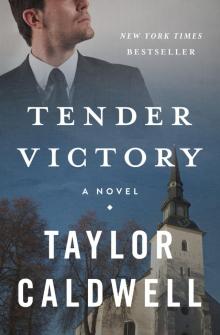 A Tender Victory
A Tender Victory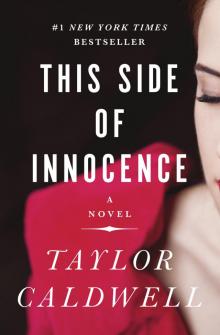 This Side of Innocence
This Side of Innocence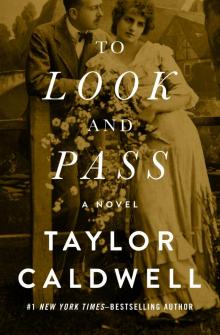 To Look and Pass
To Look and Pass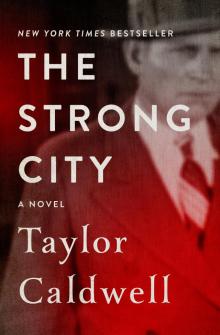 The Strong City
The Strong City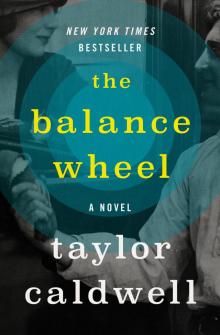 Balance Wheel
Balance Wheel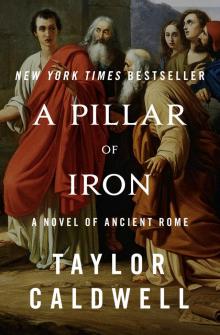 A Pillar of Iron: A Novel of Ancient Rome
A Pillar of Iron: A Novel of Ancient Rome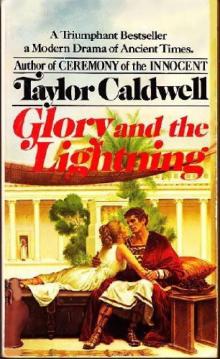 Glory and the Lightning
Glory and the Lightning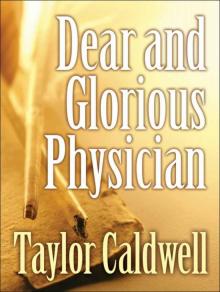 Dear and Glorious Physician
Dear and Glorious Physician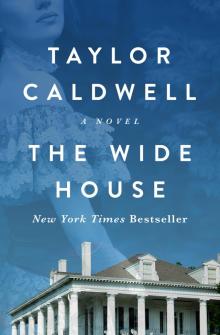 The Wide House
The Wide House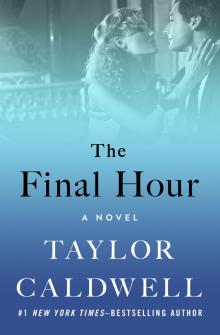 The Final Hour
The Final Hour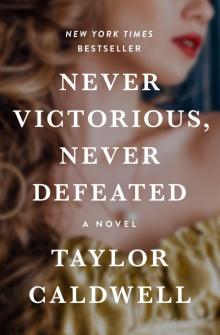 Never Victorious, Never Defeated
Never Victorious, Never Defeated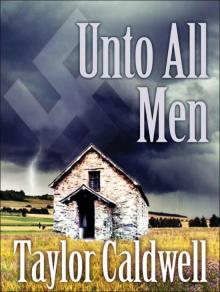 Unto All Men
Unto All Men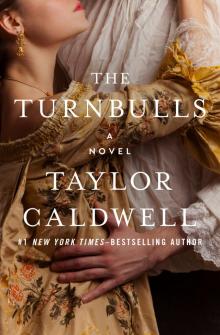 The Turnbulls
The Turnbulls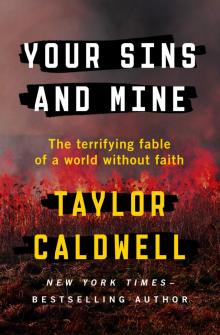 Your Sins and Mine: The Terrifying Fable of a World Without Faith
Your Sins and Mine: The Terrifying Fable of a World Without Faith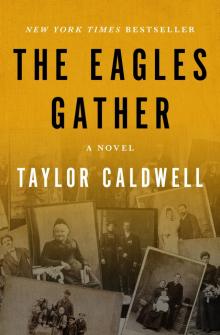 The Eagles Gather
The Eagles Gather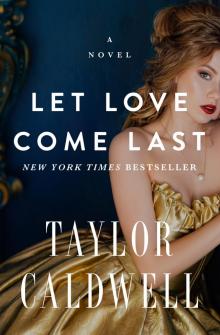 Let Love Come Last
Let Love Come Last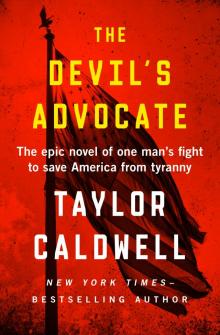 The Devil's Advocate: The Epic Novel of One Man's Fight to Save America From Tyranny
The Devil's Advocate: The Epic Novel of One Man's Fight to Save America From Tyranny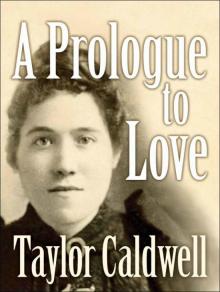 A Prologue to Love
A Prologue to Love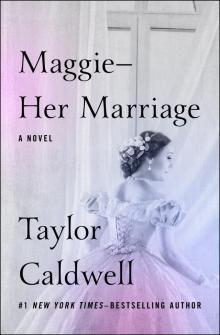 Maggie: Her Marriage
Maggie: Her Marriage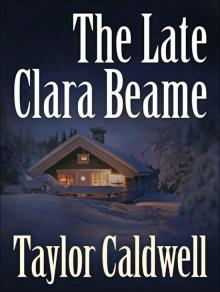 The Late Clara Beame
The Late Clara Beame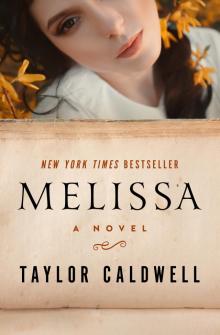 Melissa
Melissa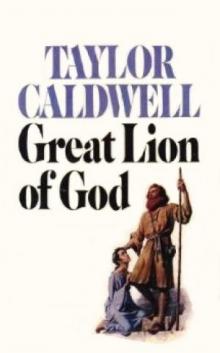 Great Lion of God
Great Lion of God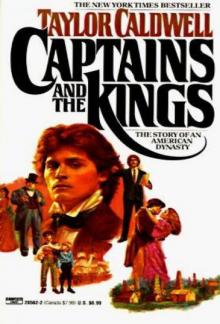 Captains and the Kings
Captains and the Kings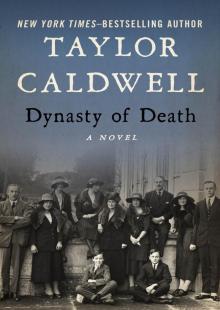 Dynasty of Death
Dynasty of Death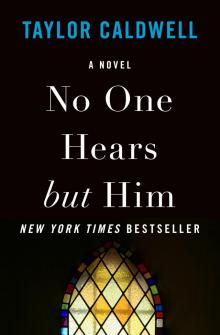 No One Hears but Him
No One Hears but Him The Sound of Thunder
The Sound of Thunder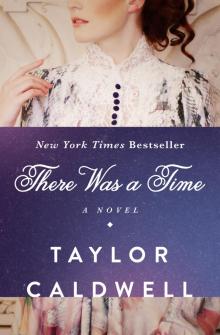 There Was a Time
There Was a Time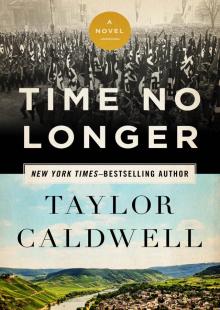 Time No Longer
Time No Longer I, Judas
I, Judas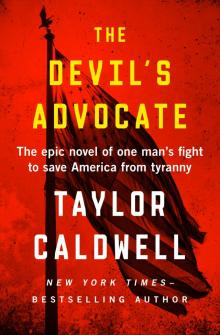 The Devil's Advocate
The Devil's Advocate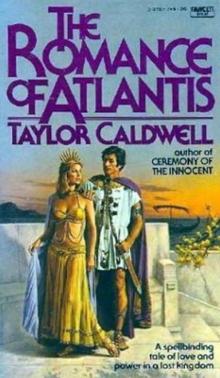 The Romance of Atlantis
The Romance of Atlantis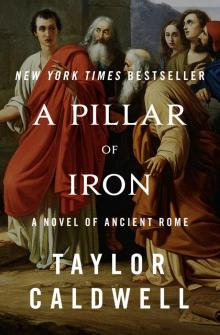 A Pillar of Iron
A Pillar of Iron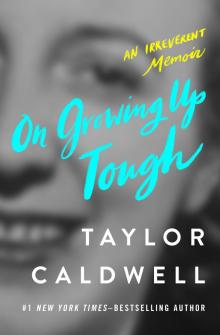 On Growing Up Tough
On Growing Up Tough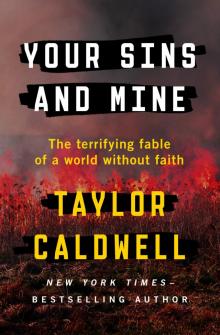 Your Sins and Mine
Your Sins and Mine